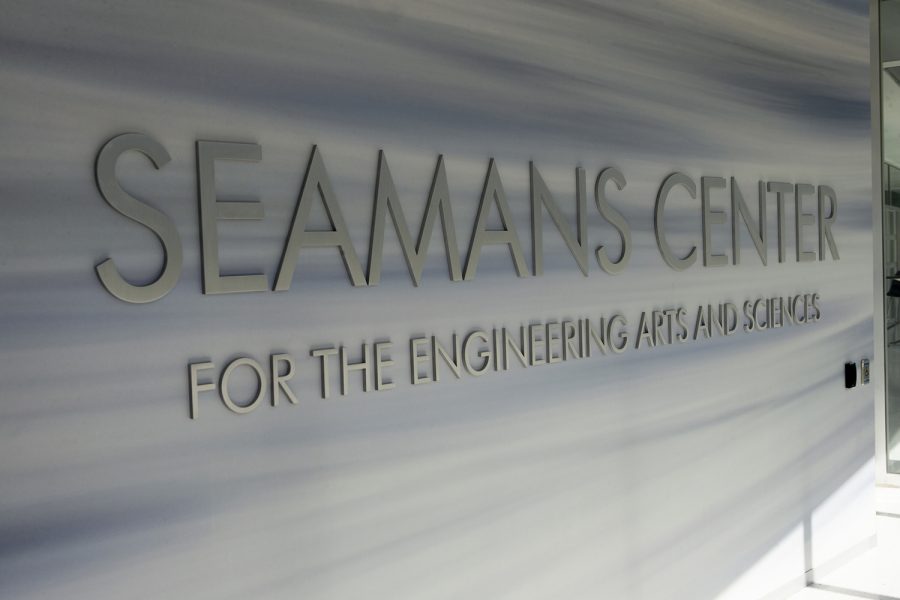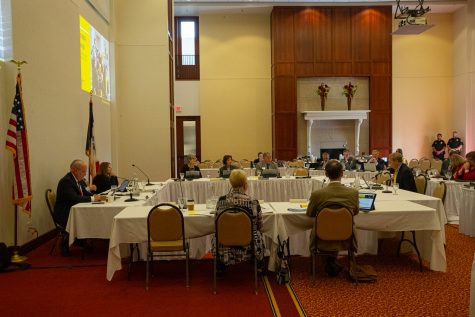UI College of Engineering uses artificial-intelligence to solve problems across campus
UI researchers use artificial-intelligence technology to solve research problems in different departments across campus. The College of Engineering is also developing classes for undergraduate students to learn more about this field.
The inside of the Seamans Center is seen on Friday, July 12, 2019. The building houses the UI College of Engineering.
July 29, 2020
The Iowa Initiative for Artificial Intelligence and the University of Iowa College of Engineering are using artificial intelligence (AI) technology to solve problems in various fields, including education, business, and public health.
Researchers in the College of Engineering are collaborating with colleges and departments across the UI campus to use AI practices to help researchers look at patterns in a faster and more efficient way.
The Iowa Initiative for Artificial Intelligence, directed by Professor of Electrical and Computer Engineering Milan Sonka, serves as a catalyst to provide technology to help researchers solve problems in their fields. The initiative was started a couple of years ago and currently funds 27 projects, Sonka said.
One project the initiative is working on is a coronavirus research project that uses algorithms to look at patterns and pooling samples to help people receive their coronavirus test results faster.
RELATED: Researchers plan to use artificial intelligence to improve health care
The data and the problem come from a specific department, and the initiative tells them how to solve the problem using AI, Sonka said. The initiative provides an opportunity for researchers who aren’t experts in AI and machine learning, Sonka said, allowing them to work with experts in the College of Engineering and with university funding.
Funding for these projects comes from the UI Office of the Provost and the specific departments that are researching the problem, Sonka said. The university is only able to provide so much money, he said, so researchers have to request money from the federal government to finish their research.
AI research is important because it can solve more problems and look at patterns more quickly than humans, Sonka said.
“There are so many ways AI can benefit us as a society,” Sonka said. “The most important thing for us as a society is that we will be able to understand complex problems much better than we can do by smart design.”
AI works by training machines to learn from the examples, UI Mechanical Engineering Professor H.S. Udaykumar said. The machines look at patterns in the data to draw conclusions and solve the researcher’s question, he added.
Sonka said that the machines need to have enough examples to learn and draw conclusions from. Otherwise, there is a danger that the results may not be accurate in some cases.
RELATED: UI researchers use artificial intelligence to identify cancer biomarkers
“Artificial intelligence techniques let us train algorithms that will find things in data that humans might be able to find, given an enormous amount of time,” said UI Professor of Biomedical Engineering Tom Casavant. “What we’ve done is mimicked that process of how humans make associations, and find connections and patterns in data, and then applied that to enormous datasets.”
In addition to this research, the College of Engineering is working to introduce more classes for students to learn about AI earlier in their undergraduate studies, Udaykumar said.
Casavant is leading a group of faculty members who are developing and teaching courses to students about machine learning and data science. Sonka and the Iowa Initiative for Artificial Intelligence provide the AI infrastructure and Casavant trains students on how to use it.
Udaykumar said it’s important for engineers to understand AI, especially as people rely more on technology.
“In the future, AI will play a larger role in creativity and will become something that humans will constantly interact with,” Udaykumar said. “Engineers of the future have to coexist with and utilize artificial intelligence to create new things.”
As the College of Engineering continues to develop AI technology, Sonka encourages researchers from all disciplines to consider using it to solve their problems. With new technology available, Sonka said the UI should consider updating its research practices to advance different fields.
“The most important message for the university and the research community is that we cannot keep doing things the way we used to,” Sonka said. “Now that new tools, new ways, and new approaches are available, we have to learn them, and we have to use them to advance.”





















